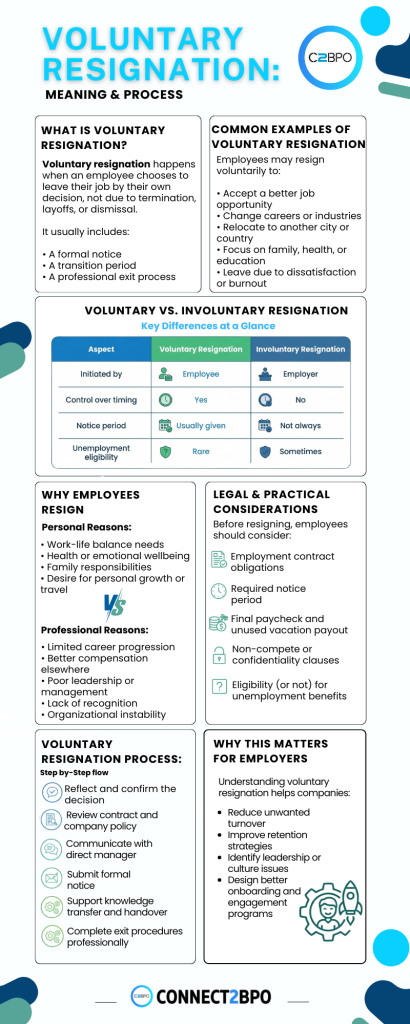Voluntary resignation is a common part of the modern workplace. Whether you are planning to quit your job for a better opportunity, personal reasons, or a career change, understanding how voluntary resignation works is crucial. In this guide, we break down what voluntary resignation means, why it happens, how to do it properly, and what both employees and employers should know.
Definition of Voluntary Resignation
Voluntary resignation occurs when an employee decides to leave their job of their own accord. Unlike involuntary termination (e.g., being fired or laid off), voluntary resignation is initiated by the employee. It is often accompanied by a written notice and typically allows time for a smooth handover.
Voluntary Resignation Meaning:
At its core, voluntary resignation means the employee chooses to end the employment relationship. It can happen for many reasons and usually involves proper notice and planning to ensure a seamless exit.
Examples:
- Resigning to take a better job offer
- Quitting to focus on family or personal health
- Leaving due to job dissatisfaction
- Pursuing entrepreneurial ventures or freelance opportunities
Reasons Why Employees Resign Voluntarily
People resign from their jobs for a variety of reasons, which can be broadly categorized into personal and professional factors.
Personal Reasons:
- Family relocation or changes in family dynamics
- Health or personal well-being
- Desire to travel or pursue further education
- Burnout or mental fatigue
- Seeking better work-life balance
Professional Reasons:
- Career advancement or a promotion opportunity elsewhere
- Better compensation or benefits packages
- Unfulfilling job roles or responsibilities
- Poor management, toxic work environments, or office politics
- Lack of training, upskilling, or development opportunities
- Organizational instability or restructuring
Voluntary vs. Involuntary Resignation
Understanding the difference between voluntary and involuntary resignation is key for both employees and HR departments.
| Feature | Voluntary Resignation | Involuntary Resignation |
| Initiated by | Employee | Employer |
| Reason | Personal choice | Performance, redundancy, and misconduct |
| Eligible for unemployment benefits | Rarely | Sometimes |
| Advance notice | Usually given | Not always provided |
| Control over timing | Yes | No |
Legal Considerations of Voluntary Resignation
While voluntary resignation is usually straightforward, there are legal implications to be aware of:
- Employment contracts may require specific notice periods.
- Final paycheck laws vary by state or country.
- Non-compete clauses might still apply after you resign.
- Accrued benefits such as unused vacation must be paid in some jurisdictions.
- Company property must be returned (e.g., laptops, ID cards, documents).
Always review your employment agreement and consult HR or legal counsel when in doubt.
Do You Get Severance Pay for Voluntary Resignation?
A common question employees have is whether they are entitled to severance pay for voluntary resignation. In most cases, severance is not required when an employee voluntarily resigns, as it is usually offered to those who are laid off or terminated without cause.
However, exceptions may apply:
- Employment contracts: Some contracts or union agreements may include provisions for severance regardless of resignation.
- Negotiated exits: In certain cases, employers may offer severance as part of a negotiated exit.
- Company policy: Some companies have generous policies that extend severance under specific circumstances.
Employees are advised to review their contracts and company policies or consult an HR representative for clarification.

Implications of Voluntary Resignation
For employees, voluntary resignation can be a positive step toward career growth or personal development. However, it is essential to consider:
- Notice periods: Failing to give proper notice can affect references and final paycheck eligibility.
- Unemployment benefits: Voluntarily resigning may disqualify an individual from receiving unemployment benefits, depending on local laws.
For employers, it is a chance to conduct an exit interview to gather feedback and make necessary improvements in the workplace.
How to Resign Voluntarily: Step-by-Step Guide
Resigning with professionalism ensures you maintain your reputation and leave on good terms.
1. Reflect and Prepare
Make sure you’ve considered your reasons and plans. Avoid making impulsive decisions.
2. Review Your Contract
Check for required notice periods, clauses, and resignation protocols.
3. Draft Your Resignation Letter
Keep it brief, professional, and polite (see template below). Using a well-written voluntary resignation letter helps maintain goodwill.
4. Inform Your Manager First
Schedule a private meeting to deliver your resignation personally.
5. Submit Written Notice
Follow up with a formal resignation letter or email.
6. Assist with the Handover
Help train your replacement or document your responsibilities. Providing guidance or creating handover documents can build goodwill.
7. Exit Gracefully
Leave with appreciation, maintain relationships, and avoid burning bridges. Request an exit interview if not offered—this is your chance to give constructive feedback.

Sample Voluntary Resignation Letter
[Your Name]
[Your Address]
[City, State, ZIP Code]
[Email Address]
[Date]
[Manager’s Name]
[Company Name]
[Company Address]
Dear [Manager’s Name],
I am writing to formally resign from my position at [Company Name], effective [last working day, typically two weeks from the date above].
This decision was not easy and took a lot of consideration. I’ve enjoyed working with the team and am grateful for the opportunities and experiences I’ve had here.
I will do everything I can to ensure a smooth transition before my departure.
Thank you for your support and understanding.
Sincerely,
[Your Name]
Tips for a Successful Resignation
- Be honest, but tactful: When discussing reasons for leaving, be truthful without being overly negative.
- Plan financially: Make sure you have savings or another opportunity lined up.
- Avoid gossip or negativity: Don’t speak poorly about the company or colleagues as you exit.
- Request a reference: Ask your manager for a recommendation or LinkedIn endorsement.
FAQs About Voluntary Resignation
Can I get unemployment if I resign voluntarily?
Usually, no. However, if you left for a “good cause” (e.g., harassment, medical reasons), you may be eligible depending on your location.
Do I have to give two weeks’ notice?
Two weeks is standard in the U.S., but it’s not a legal requirement unless your contract states otherwise. In some industries, a longer notice may be expected.
Will quitting affect my future job prospects?
Only if handled poorly. Resigning professionally can actually enhance your reputation. Hiring managers often value employees who leave with integrity.
Can I take my unused PTO after I resign?
This depends on your company’s policy and local labor laws. Some employers pay out unused vacation, while others require you to use it before leaving.
Can I withdraw my resignation after submitting it?
You can try, but your employer is not obligated to accept the withdrawal. Timing and your relationship with the employer matter here.
Final Thoughts
Resignation voluntary actions mark a new chapter in your career. Whether you’re chasing personal goals or professional growth, resigning the right way sets the tone for future success.
Voluntary resignation is a significant decision that should be handled thoughtfully and respectfully. Whether you’re seeking better opportunities or prioritizing your well-being, following the right steps helps you exit with grace and maintain professional relationships.
By understanding your rights, responsibilities, and options, you can navigate your resignation confidently and set the stage for your next career move.
Always leave with professionalism, gratitude, and clear communication—these will serve you well in your next role and help build a lasting reputation.


